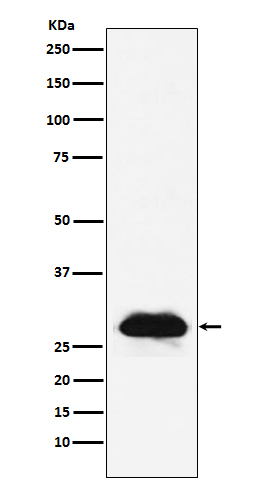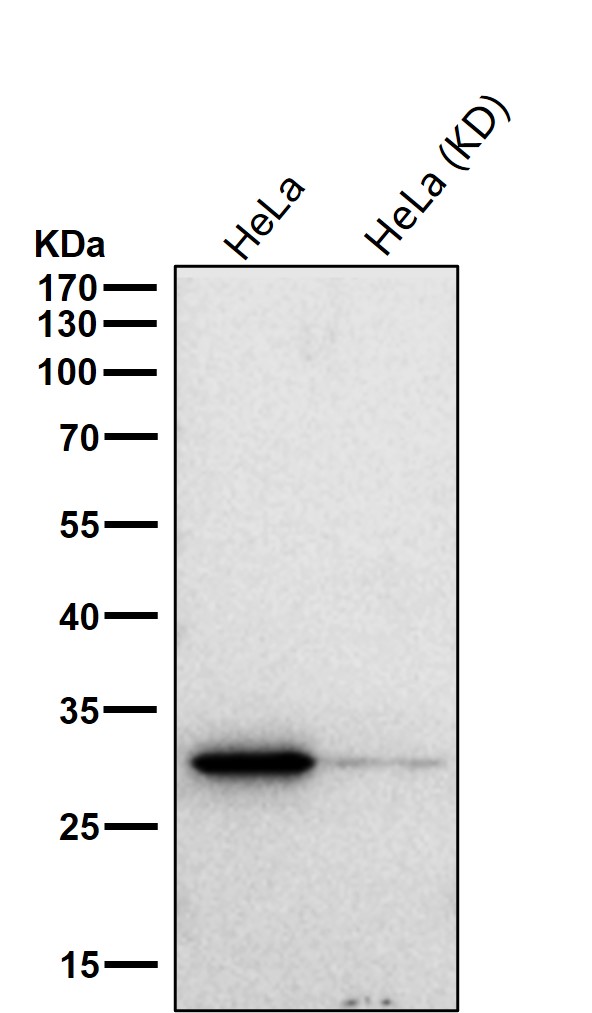

| WB | 咨询技术 | Human,Mouse,Rat |
| IF | 咨询技术 | Human,Mouse,Rat |
| IHC | 1/100-1/200 | Human,Mouse,Rat |
| ICC | 技术咨询 | Human,Mouse,Rat |
| FCM | 咨询技术 | Human,Mouse,Rat |
| Elisa | 咨询技术 | Human,Mouse,Rat |
| Aliases | Carbonic anhydrase 2; Carbonate dehydratase II; Carbonic anhydrase C; CAC; Carbonic anhydrase II; CA-II; CA2;;Carbonic anhydrase 2 |
| WB Predicted band size | 29 kDa |
| Host/Isotype | Rabbit IgG |
| Antibody Type | Primary antibody |
| Storage | Store at 4°C short term. Aliquot and store at -20°C long term. Avoid freeze/thaw cycles. |
| Species Reactivity | Human,Mouse,Rat |
| Immunogen | A synthesized peptide derived from human Carbonic anhydrase 2 |
| Formulation | Purified antibody in PBS with 0.05% sodium azide,0.05% BSA and 50% glycerol. |
+ +
以下是关于Carbonic Anhydrase II(CA2)抗体的**模拟参考文献示例**(仅供格式参考,具体内容需查询真实数据库):
---
1. **文献名称**: *Autoantibodies to Carbonic Anhydrase II in Sjögren's Syndrome: Biomarkers for Disease Severity*
**作者**: Zhang, L. et al.
**摘要**: 研究干燥综合征患者血清中CA2抗体的存在及其与唾液腺功能障碍和疾病活动性的相关性,提示CA2抗体可能作为疾病进展的潜在生物标志物。
2. **文献名称**: *Monoclonal Antibody Targeting Carbonic Anhydrase II Suppresses Tumor Growth in Colorectal Cancer Models*
**作者**: Tanaka, K. et al.
**摘要**: 开发了一种靶向CA2的单克隆抗体,通过抑制其酶活性减少结肠癌细胞增殖和体内肿瘤生长,为癌症治疗提供新策略。
3. **文献名称**: *Carbonic Anhydrase II Autoantibodies in Renal Tubular Acidosis: Diagnostic Utility*
**作者**: Alper, S.L. et al.
**摘要**: 探讨CA2抗体与遗传性或获得性肾小管酸中毒的关联,验证其在临床诊断中的敏感性和特异性。
4. **文献名称**: *Structural Analysis of Human CA2-Antibody Complex Reveals Novel Epitopes*
**作者**: Müller, C.E. et al.
**摘要**: 通过X射线晶体学解析CA2与其单克隆抗体的复合物结构,揭示了关键结合表位,为抗体工程优化提供依据。
---
**建议**:可通过PubMed或Google Scholar搜索关键词“Carbonic Anhydrase II antibody”、“anti-CA2 autoantibody”获取真实文献。例如:
- PubMed链接:https://pubmed.ncbi.nlm.nih.gov/
- 使用筛选工具限定近年研究或高引论文。
Carbonic anhydrase 2 (CA-II) is a zinc-metalloenzyme that catalyzes the reversible hydration of carbon dioxide to bicarbonate and protons, playing a critical role in pH regulation, ion transport, and fluid balance. It is widely expressed in tissues, including kidneys, erythrocytes, gastric mucosa, and the central nervous system. CA-II dysfunction is linked to genetic disorders like osteopetrosis with renal tubular acidosis and cerebral calcification, as well as acquired conditions such as glaucoma and cancer.
Antibodies targeting CA-II are essential tools for studying its expression, localization, and function in physiological and pathological contexts. These antibodies are commonly used in techniques like Western blotting, immunohistochemistry, and immunofluorescence to investigate CA-II's role in diseases. For example, in cancer research, CA-II antibodies help explore tumor microenvironment acidification, a process linked to metastasis and drug resistance. In neurology, they aid in examining CA-II's involvement in pH homeostasis and neurodegenerative disorders.
CA-II antibodies are typically validated for specificity across species, particularly human and mouse, ensuring reliability in diverse experimental models. Their applications extend to diagnostic assays, therapeutic target validation, and biomarker discovery, underscoring their importance in both basic research and clinical translation.
×